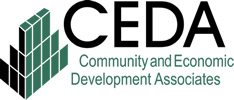by Michelle Sharp
A real live wool baroness—right here in Minnesota!
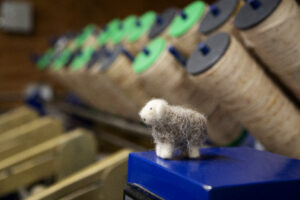 Theresa Bentz of Get Bentz Farm builds an interactive agricultural experience in the hills outside Northfield. Grass-fed
Theresa Bentz of Get Bentz Farm builds an interactive agricultural experience in the hills outside Northfield. Grass-fed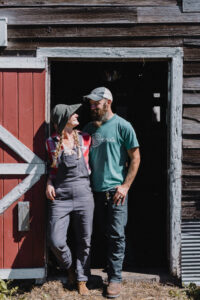 sheep battle invasive species, on-farm fiber art days encourage community, discard wool becomes garden food and two city kids experiment daily with their hypothesis about a different way to live and work.
sheep battle invasive species, on-farm fiber art days encourage community, discard wool becomes garden food and two city kids experiment daily with their hypothesis about a different way to live and work.
After years working in higher education and corporate careers, Jake and Theresa cut a new path for their family. “Although I was guaranteed a paycheck working for somebody else, I wasn’t guaranteed satisfaction, respect or to be valued for the commitment I gave,” reflects Theresa. “If I worked 80 hours a week teaching, no one would pat me on the back. I decided to work for myself and set my own standards. That understanding took away the fear of starting our own business.”
A NEW SPACE
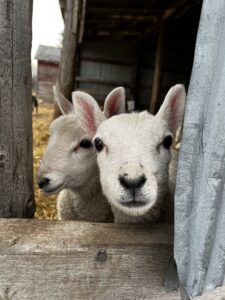 At the start, the farm focused on pasture-raised direct-to-consumer sheep and lamb meat sold at farmers markets. They raise their flock following sustainable practices of rotating pastures and allowing the sheep to browse a diverse array of plants. Their lamb is regularly on Northfield’s Ole Store’s menu, including custom lamb brats.
At the start, the farm focused on pasture-raised direct-to-consumer sheep and lamb meat sold at farmers markets. They raise their flock following sustainable practices of rotating pastures and allowing the sheep to browse a diverse array of plants. Their lamb is regularly on Northfield’s Ole Store’s menu, including custom lamb brats.
Persistent drought conditions in Minnesota forced the decision to reduce the size of their flock. Diving headfirst into fiber art production and agritourism allowed their farm to expand its available products while maintaining a sustainable presence on their land. When guests come to the farm they meet the sheep, visit the natural dye garden, walk in the pasture and see the on-site mill. Being at the farm allows guests to appreciate the cycle that produces both the meat for their meals and the textiles that clothe them. 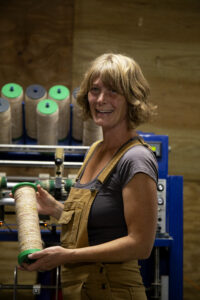
YOU CAN’T HAVE YARN WITHOUT FARMS
Being recognized as an agricultural producer when the farm shifted into fiber arts proved to be a challenge. “I had to fight pretty hard to get into farmers markets and not be seen as a crafter,” states Theresa. “Textiles are agricultural products. The yarn that makes the cloth that makes your clothing, unless it’s polyester, came from an animal. We’ve largely become very disconnected from our textile production just like we have with large scale food production. When I speak at knitters guilds, agricultural conventions or wellness centers, I bring it back to where these items come from. It wakes people up as to why I’m a farmer selling textile products.”
Theresa reflected on the fact that textiles used to be a form of currency. In fact, the tremendously wealthy and influential Medici Family gained their fortune through the production and sale of wool. During the two global world wars, women knitted morse code messages into socks and scarves sent to the front. There’s a tremendous creative space in fiber arts, which are enjoying a resurgence in respect. “Grandma skills” are trending with crocheting, knitting and upcycling textiles to make something new all having active followings on line and in real life.
BUILDING BADGER FACE FIBER
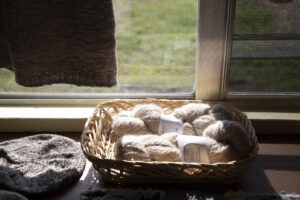 As the baroness of Get Bentz Farm, Theresa uses both wool from her flock and fleece purchased from shepherds throughout the region to create her signature products. “I love that I’ve become a producer of yarn in our industry,” smiles Theresa. “I enjoy having control over the end product. I get to collaborate with others to create something that
As the baroness of Get Bentz Farm, Theresa uses both wool from her flock and fleece purchased from shepherds throughout the region to create her signature products. “I love that I’ve become a producer of yarn in our industry,” smiles Theresa. “I enjoy having control over the end product. I get to collaborate with others to create something that 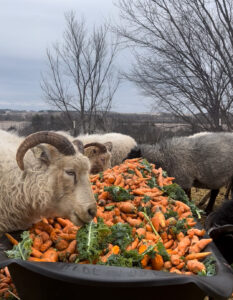 people use.”
people use.”
In 2024 Get Bentz established a new product line, Badger Face Fiber, named for an esteemed founding member of their flock. Being a part of the “yarn beast” as Theresa calls it, allows her to create and facilitate others’ creations. “I love the creating part. I love getting in there and having all this raw material for me to make something,” explains Theresa. “It’s really, really cool when people show me what they’ve made from a product we created. They know that our yarn will never be the same twice because the animals are different every time you shear. We’re all learning to appreciate the variability.”
Get Bentz and Badger Face customers know to purchase the yarn for their full project up front. Once a particular batch is gone, it’s gone.
GROWING WITH RBIL
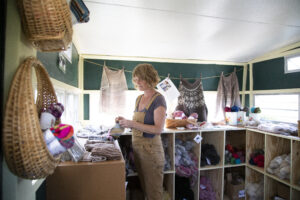 Get Bentz is a graduate of the 2024 cohort of the Rural Business Innovation Lab. Founded by CEDA, RBIL is a cohort-based, entrepreneurial program that redefines the narrative of rural decline. Each cohort builds a peer network dense with ideas, expertise and resources that help rural small businesses start and scale their work within their communities. Working in both Minnesota and Wisconsin, RBIL supports rural businesses in their growth to become sustainable drivers of economic health.
Get Bentz is a graduate of the 2024 cohort of the Rural Business Innovation Lab. Founded by CEDA, RBIL is a cohort-based, entrepreneurial program that redefines the narrative of rural decline. Each cohort builds a peer network dense with ideas, expertise and resources that help rural small businesses start and scale their work within their communities. Working in both Minnesota and Wisconsin, RBIL supports rural businesses in their growth to become sustainable drivers of economic health.
The content and interactions of the RBIL program helped Theresa recognize what she did and, perhaps even more 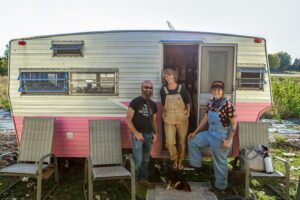 importantly, what she did not want to do during a big year of growth for their farm business. “The coaches at RBIL helped me push myself into areas where I didn’t think I was going to be comfortable,” says Theresa. “I bought a Yamper because we identified that I didn’t have a good place to sell my yarn on the farm. It’s turned out to be really fun. Our yarn camper is a mobile yarn mobile. We now are able to participate in events where we wouldn’t have otherwise because of building this mobile interactive space.”
importantly, what she did not want to do during a big year of growth for their farm business. “The coaches at RBIL helped me push myself into areas where I didn’t think I was going to be comfortable,” says Theresa. “I bought a Yamper because we identified that I didn’t have a good place to sell my yarn on the farm. It’s turned out to be really fun. Our yarn camper is a mobile yarn mobile. We now are able to participate in events where we wouldn’t have otherwise because of building this mobile interactive space.”
Theresa also emphasized how the RBIL program helped organize her thoughts about the business. “Knowing about the resources available is so important,” states Theresa. “Also the coaches helped us sort out what parts of our business we wanted to scale up and what was as big as we want it to be.”
GET IN TOUCH
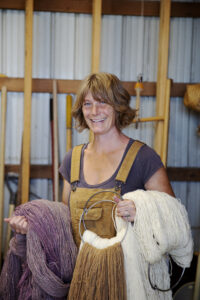 Sign up for the monthly Get Bentz newsletter, which includes the perspective of the flock itself, at https://getbentzfarm.com
Sign up for the monthly Get Bentz newsletter, which includes the perspective of the flock itself, at https://getbentzfarm.com
View upcoming classes and on-farm events, browse the fibers, woolen products and locally-processed meats available. Find Get Bentz at the Linden Hills and Mill City Farmers Markets.
Follow @getbentzfarm on Facebook and Instagram for Theresa’s sustainable fashion inspiration, sassy sheep and life on the farm.
Contact Cameron Payne cameron.payne@cedausa.com at RBIL to learn more about the program. Visit https://www.cedausa.com/ruralinnovation/ for a program overview.
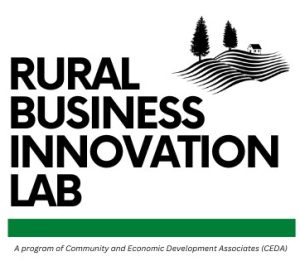 Follow Meet the Minnesota Makers @meettheminnesotamakers on Ambit, Facebook, Instagram, and LinkedIn.
Follow Meet the Minnesota Makers @meettheminnesotamakers on Ambit, Facebook, Instagram, and LinkedIn.
This story was originally published to Meet the Minnesota Makers and is shared with permission. The link to the original article can be found here.
